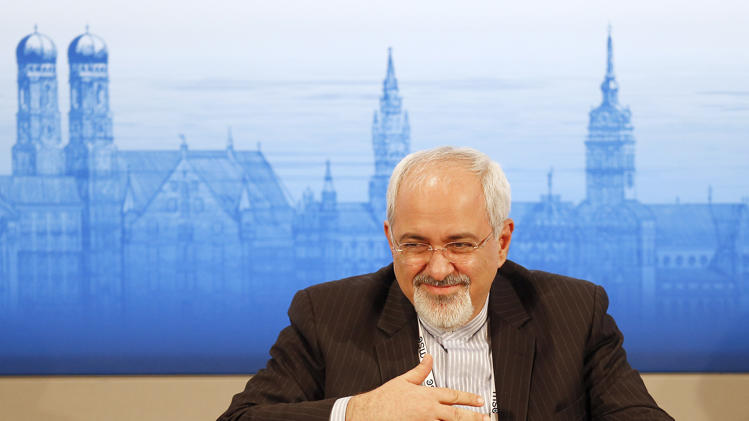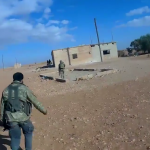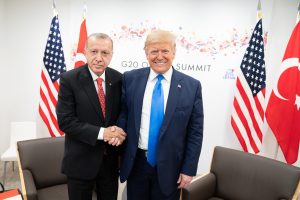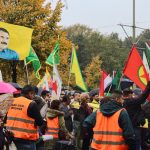by Farideh Farhi
The meeting between Javad Zarif and John Kerry on the sidelines of the Munich Security Conference on Feb. 2 was reportedly mostly focused on nuclear negotiations. But this didn’t prevent a “senior US official” from telling reporters that Kerry also tried to bring in Syria.
According to this anonymous official, “Secretary Kerry raised his concerns about the delay in moving chemical weapons to the port in Latakia, and the humanitarian situation on the ground specifically in the besieged areas.” Iran was also urged “to show a willingness to play a constructive role in bringing an end to the conflict.”
Alas, again according to the US official, when Kerry raised the issue, Zarif indicated that he was not authorized to discuss Syria.
This is an interesting plant devoid of any context for the reader regarding why Zarif might not want to talk about Syria with Kerry. To be sure, Steven Erlanger of the New York Times did offer one line of context: Zarif apparently declined to participate in this conversation because “Iran’s policy on Syria is not controlled by the Foreign Ministry.”
Conveniently forgotten is Kerry’s condescension on Jan. 6 that Iran could “contribute from the sidelines… to help the process.” The spectacle of Iran’s invitation and then dis-invitation by Ban Ki-moon to Geneva II under pressure from the same Secretary of State is not mentioned either.
Even those who may be unfamiliar with Iranian politics will be able to discern that Zarif’s refusal had less to do with his lack of authorization to talk Syria policy and more with the decision of the political leadership in Iran, which now includes Zarif, to tell Kerry that he cannot have his cake and eat it too.
Ultimately, this event is telling commentary about the US leadership’s presumption that it can easily engage in public denigration of Iran and then have a closed-door conversation regarding the input Iran can — and should — have in a process that it was barred from participating in publicly.
Let’s be clear, the issue was not Zarif’s lack of authorization per se. The point was that if Iran is called upon to show a “willingness to play a constructive role,” then it should be treated like a stakeholder in the process. Kerry’s predicament was likely caused by a full-blown Saudi freak-out over Iran’s participation. But given the circumstances, there is really no reason for Iran to show understanding of Kerry’s predicament even behind closed doors.
Zarif has as much input in Iran’s Syria policy these days as Kerry does in the US’ Syria policy. The highly fluid dynamics on the ground limits them both; so does input by other institutions, including the military and security establishments, and domestic political actors. The difference lies in the current reality that the US’ Syria policy is confused, conflicted and under pressure while Iran’s is not.
Iran’s support for the Assad regime is odious and yet its long-standing warnings that the attempt to remove Bashar al-Assad will open the path for sectarian extremism and a deepening of the conflict — irrespective of whether the Assad regime or even the Iranian regime have fed extremism and the conflict — have proven correct. Tehran faces little pressure or conflict at home regarding its role in Syria and can rely on Moscow to make sure that Assad does not fall. Lest we forget: it was Russia that prevented UN Security Council resolutions against Assad’s regime. And despite all sorts of reports regarding Iranian arms shipments, technical and intelligence assistance, and even personnel support, Russia remains Assad’s much more consistent and robust arms supplier and supporter.
This is why Zarif reacted to Iran’s dis-invitation to Geneva II with a shrug. An invitation would have been nice and an official acknowledgment of Iran’s role as a key player in the region. It would have also made Iran a stakeholder in the resolution of the Syrian conflict through an internationally guided process. A behind-closed-doors conversation regarding what Iran can do to help, on the other hand, offers nothing.
Meanwhile back in the USA, if this report is correct, even Kerry has lost faith in his administration’s approach to the crisis in Syria. Laments are plenty: Assad is failing to uphold his promises on chemical weapons; Russia is not helpful and continues to supply arms (there is tellingly no reference to Iranian arms and support here); and Geneva II is not working. In the hawkish Senator Lindsey Graham’s rendition, Kerry “openly talked about supporting arming the rebels. He openly talked about forming a coalition against al Qaeda because it’s a direct threat.”
Graham is likely placing his wishes on Kerry’s tongue. Nevertheless, he stands at one pole pressuring an administration that is well aware of another pressure pole consisting of a general public that wants nothing to do with another mission creep in the Middle East. If the political process doesn’t go anywhere, pressures to do something else are bound to increase.
But as far as the US-Iran dynamic regarding Syria is concerned, the basic issue persists. If Iran is influential in sustaining the Assad regime, then turning it into a stakeholder in the political process makes eminent sense — but not behind closed doors or on a seat in the back of the room.






Patrica, you’ve confused me with this. Siting first one profession, then another, well, at least you cleared that up. That said, are you in favor of bombing Iran as Netanyahoo would have the U.S. do? Do you realize what that could do, not just to Iran, but a large part of the M.E. from the fall out? And then who would gain from such an action? Have you even considered the death toll?
@Norman – – The conspiracy to set up the illegal and idiotic US invasion of Iran, was rooted in the neocons (and other extremist “pro-Israel” groups). “The road to Jerusalem runs through Baghdad”. Etc etc etc. I think a primary objective was to enable Israel to keep much if not all of the West Bank, and Golan Heights if possible too.
IRAQ, not Iran. (comment to Norman) Iran was to be dealt with later on.
James, You are probably right about President Carter blundering the hostage crisis. However, I’m not inclined to believe that Iran would have quickly negotiated their release. They ignored International Law by attacking and taking over our embassy. The hostages were used to whip up support for their Iranian Revolution and to embarrassed the US for having supported the Shah.of Iran.
Norman, I’m a “hawk” in regards to Syrian starving people and waiting until they go to the market to get food then bombing the market or dropping barrel bombs on the civilians. As a :hawk” I’d support no-fly zones or grounding the Syrian air force all together until they allow all civilians who want out of Syria out. Ideally, the UN should do this rather than just the US.
As a “hawk” if Israel believes that Iran has a nuclear weapon coming online through their intelligence gathering and they tell the US their plans, I’d hope that we’d stay out of it especially in light of Iran sending ships into US waters: http://www.cnn.com/2014/02/10/world/meast/iran-navy-near-u-s-/
Israel should only go after nuclear facilities and the air force and missile delivery systems. I do not support using nuclear bombs unless they are used against us and even then, if the country only has a few, we may be able to take them out before they detonate. I’m not for anymore troops on the ground unless it is through the UN and several countries step up to help.